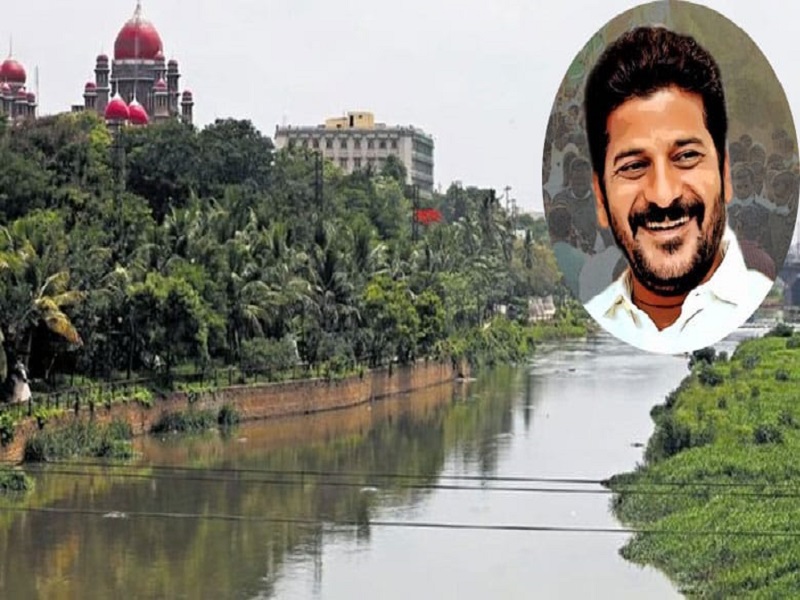Telangana Congress chief Revanth Reddy‘s ambitious Musi riverfront development project has triggered widespread criticism from environmentalists and local activists. Opponents argue the project threatens the ecosystem, risks displacement of vulnerable communities, and prioritizes commercial interests over sustainable growth. Supporters, however, see it as a transformative effort to revitalize Hyderabad’s riverfront.
Telangana chief minister A. Revanth Reddy is pursuing an ambitious Musi Riverfront Development Project to clean up the river flowing through Hyderabad and beautify its banks, thereby giving the city a facelift. His plan is to shape the project on the lines of the Sabarmati Riverfront Project in Ahmedabad.
The Musi initiative is estimated to require a staggering investment of over Rs 50,000 crore.
Besides funding, there are several challenges to the river’s rejuvenation, such as installing 13 more sewage treatment plants with a combined capacity to treat 970 million litres of effluents a day. An East-West corridor will also be developed along the river’s two sides, helping simplify commuting to the city. Heritage bridges would be constructed across the river at 16 locations, where hawkers would be given business space.
Within weeks of assuming office on December 7 last year, Reddy had attended World Economic Forum meetings in Davos to raise funds for Telangana. He also travelled to London for a first-hand appraisal of the efforts to revive the Thames river.
On his return, after plans drawn up earlier were tweaked, the Congress government began demolitions to clear encroachments, especially of squatters along the Musi riverbank, and relocated them to the vacant 2BHK apartments built during the previous Bharat Rashtra Samithi (BRS) rule.
But objecting to the rehabilitation, some of those evicted in recent weeks rallied behind the BRS to espouse their cause. With an eye on the Greater Hyderabad Municipal Corporation elections due in 2026, the BRS is trying to capitalise on the issue. The ‘pink party’ is backing the Musi project evictees despite the fact that the river restoration initiative was launched by BRS supremo K. Chandrashekar Rao while he was chief minister.
The late Y.S. Rajasekhara Reddy, as Andhra Pradesh chief minister before the state’s reorganisation, had shelved a similar idea in the early 2000s, considering the Rs 950 crore cost as prohibitive and the required human resettlement a sensitive issue.
In a strategic move, the BRS is positioning itself as the messiah of the Musi evacuees by trying to convert the controversy into a political campaign.
But an unfazed Revanth Reddy has doubled down on his resolve to see through the project whatever be the political cost. “I am aware that relocating the Musi dwellers would make them angry. I know it is politically unwise for me. Yet I want to go ahead as I am doing it for posterity,” asserts the chief minister. He is clear that Telangana cannot let its future generations suffer by letting hazardous wastes flow into the Musi river.
To poke the BRS, Reddy has urged it to spend Rs 500 crore from party funds to help the Musi dwellers lead a life with dignity and also join the Congress in taking an all-party delegation to Prime Minister Narendra Modi to release adequate funds to complete the project swiftly. “Is it wrong to offer them (evacuees) 2BHK apartments and pay Rs 25,000 towards shifting expenses? Do you want them to languish in poverty and squalor forever?” asked Reddy, adding: “We have already sanctioned 15,000 double-bedroom houses for the Musi evacuees, who may not be more than 12,000 families.”
Sustainability specialist B.V. Subba Rao calls for caution. “For a riverfront project to be viable and implemented quickly, the system has to sustain its image by building trust and confidence in the hearts and minds of citizens, but without yielding ground to political pressure,” said Rao. He pointed out that stakeholder participation was missing so far.
The government’s goal is to begin by clearing encroachments. “Musi river encroachment has become rampant. But it is not irreversible and impossible,” said public policy analyst D. Narasimha Reddy.
The detailed project report (DPR) for the Musi plan is yet to be prepared. Glossing over earlier initiatives, the Reddy government has chosen the Meinhardt Group, a Singapore-based firm, for the riverfront development.
The BRS has alleged lack of transparency and raised concerns about legal tangles the Meinhardt Group apparently has had in Pakistan. However, the Telangana government maintains that due process was being followed and that Meinhardt’s track-record in India included projects such as the Statue of Unity in Gujarat.
On October 4, the state’s municipal administration and urban development department notified the sanction of funds and work orders to the Musi Riverfront Development Corporation Limited and granted Rs 166.5 crore for the aggregate master planning. Additionally, it issued orders and letters of acceptance to Meinhardt and other firms.
Due process of law stipulates that the DPR be prepared, estimates made, public consultations held and project implementation taken up, which would include rehabilitation of the poor. Flagging concerns, civil society groups have called for ushering in the changes through responsible governance.
Significantly, Telangana does not have a relief and rehabilitation policy to deal with displacement and land acquisition. “Musi rejuvenation should be a comprehensive project with adequate laws in place and an institutional set-up such as a Musi River Basin Authority,” said Narasimha Reddy. But the chief minister seems to be a man in a hurry, perhaps eager to overcome the displacement-related preconditions of project funders before they step in.#hydkhabar

